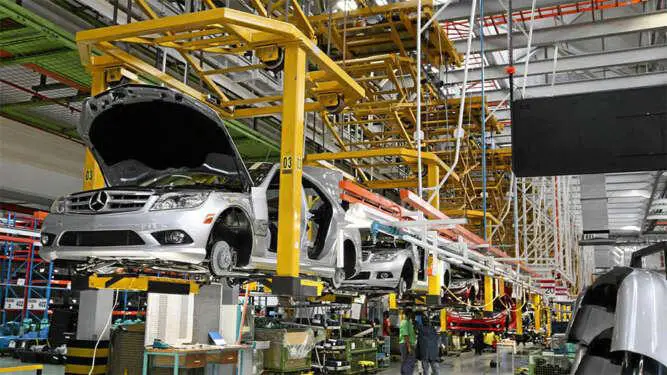- Wärtsilä Energy offers tips on how Africa can navigate energy transition and grid reliability
- Powering Africa: Africa’s Path to Universal Electricity Access
- Global investment trends at AIM Congress 2024: a spotlight on the keynote speakers
- South Africa’s deepening investment ties in South Sudan oil industry
- Agribusiness could drive Africa’s economic prosperity
- Dawood Al Shezawi: Why AIM Congress 2024 is the epicenter of global economic and cultural dialogues
- d.light’s 600,000 cookstoves project verified as top source of quality carbon credits
- Artificial intelligence (AI) could create a turning point for financial inclusion in Africa
Browsing: Doing business in africa
A mineral-rich continent, with a fast-growing economic potential and a considerable population stands a chance to become a predominant global hub for trade and investment. Africa’s growth potential has been mainly driven by a significant surge in investment, as indicated by the African Development Bank. As opposed to consumption expenditure driving economic growth, industry players and governments have realised the long-term benefits of investment to the growth of African economies. A longevity approach to a sustained growth of the African continent as a whole is the thrust of Agenda 2063 of the African Union, propelled by the African Continental Free Trade Area (AfCFTA) agreement. …
China has a well-established presence on the African continent. On the positive side, a lot of infrastructure development taking place is a direct result of Chinese funding. In addition, several big Chinese companies have taken root in Africa becoming significant contributors to employment and GDP. Examples include Citic Constructions, Sunshine group, and FAW. Mckinsey and Company research group estimates that in 2012 there were over 10000 Chinese-owned companies operating in Africa, the number has since increased.
However, there has long been suspicion around Chinese funding, especially through debt as most deals are shrouded in mystery and hidden behind closed doors. One example is Zambia’s current debt conundrum, in which reports indicate the country owes China large sums of money but circumstances around the debt are unclear in terms of the duration and the cost.
Additionally, indications are that some of the debt facilities come with collateralized arrangements in which Africa …
Unemployment remains one of the biggest socio-economic challenges in current times. This has been made worse with the recent hit that countries have experienced due to the global pandemic that has significantly slowed down the growth of economies across the globe.
Many people have lost their jobs while others have had their salaries reduced; all of this is putting pressure on employees to meet the expenses and demands of basic living. This is why people are now turning to entrepreneurship to make a living or expand their income by running a ‘business on the side’. Our Reporter Kawira Mutisya has researched and come up with several pointers on what makes an entrepreneur. These should play a role in guiding those just joining the bandwagon. …
Although 2020 proved to be quite a challenge to productive sectors all around the world due to the COVID-19 pandemic, the African start-ups we will look at in this article have continued to grow and further develop regardless of this global problem.
2021 stands to be a critical year for Africa, and for that matter, African tech companies and African start-ups.
We will take a look at specific start-ups in Africa from North, South, East and West Africa.
With the continent’s progression towards development, these specific African countries are playing a big role in doing just that. Without further delay let’s begin with Mali’s specific start-up which is OKO Finance.
Also Read: Microsoft 4Afrika launch Entrepreneurship programme for start
…The US and China, two of the world’s biggest superpowers, are currently in the midst of a trade war. The battle centres around the uneven trade deficit between the two countries. While Africa may not be a direct participant of the war, there is a risk of the continent getting caught in the crossfire.
The Titans At War
In 1995, the US-China trade deficit stood at around $45 billion in favour of China. By 2018, the trade deficit had reached approximately $420 billion.
The ballooning deficit triggered a response from the American administration which accused China of unfair trade practices and intellectual property theft. Both parties threw words, tariffs and tweets in each other’s direction. Truce talks have provided periodic calm periods in between the storm. Both economies have suffered in the process recording significant declines in exports, income and local business activity. The rest of …
The African continent takes pride in its rich natural resources. The continent boasts of a wide range of minerals, oil, gas, and wildlife among many other commodities. Most African economies are heavily dependent on these resources. Revenue for most is mainly commodity-driven for example, Botswana’s diamonds make up 90% of the country’s total exports. In Nigeria, oil accounts for more than 80% of exports and Zambia is reliant on its copper mines for 70% of its exports.
In the majority of cases, African countries are net exporters of the raw commodity making them more vulnerable to the price shocks and changes in demand. Facilitating trade within Africa may be the roadmap to unlocking Africa’s economic potential.
Also Read: All eyes on EAC border points as massive delays bite | KenTrade
Two of Africa’s largest trading partners, the US and China, have been dueling for world economic dominance. There …
While many company executives focus on product development and budget cuts, forgetting that the company success will largely depend on customer satisfaction. As we wrestle with Covid-19 pandemic and global recession, how companies interact with their customers is more vital than ever before making customer experience as the key ingredient that will determine the success of any company.
Most research carried out in 2020 such as Adobe Digital Trends, ranks customer experience at the top a head of digital marketing, video marketing and even social media. A survey by Deloitte in 2017 on Global Contact Center, found that 88 percent of companies now prioritize customer experience in their contact centres. Companies offering better customer experience earned between 4 and 8 percent more than their competitors as seen in SmartInsights and Temkin Group 2019. Brands that create a company culture focused on customers help their employees work together to …
None of us particularly like money-lenders and few of us would want the stress and unpleasantness of being the type of money-lender that proliferates in cities like Kampala – leeching returns of 10% a month against assets pledged by desperate borrowers. The reason that these bloodsuckers can exist is that access to credit on reasonable terms, or at all, from banks is still so difficult to get for most businesses.
Also Read: Mobile money loans affecting banks’ lending – report
The fact is that there are some great businesses that cannot grow and often struggle to survive because cash-flow is such a huge problem. In Europe many businesses use “factoring” to improve their business cash-flow and reduce the time they spend trying to collect money. But the truth is that the banks that provide this service are so selective about the businesses they deal with and the invoices they process …
VUCA (Volatility, Uncertainty, Complexity and Ambiguity) in Sub-Saharan Africa presents challenges to doing business that are distinct and unique to each market in the region. Such issues as political and economic risk which affect business decisions and hamper business growth in some climes, language barriers and cultural distinctions which affect communication and understanding in trade and currency value disparities all create opportunities for solutions through strategic government relations.
Also Read:Coveting larger markets: Ethiopia’s bid to join WTO
Forbes®, in defining the meaning of the acronym, explains that ‘Volatility’ refers to rate of change at a market or global scale. The more volatile the market is, the higher its chances of change. ‘Uncertainty’ deals with the level of confidence with which the future can be predicted. Where the market situation is uncertain, there is greater difficulty to predict and anticipate a market shift. ‘Complexity’, which refers …
John-Allan Namu is a daring man. Few people have encountered live bullets, seen the real face of war, tracked down drug lords, had threats made on their lives, and still kept at it. Journalism is not for the faint hearted, and it not just a profession for John-Allan, it is a calling.
The investigative journalist doubles up as the CEO of Africa Uncensored, an investigative and in-depth journalism production house in Nairobi, Kenya.
He has bagged numerous awards, key among them the coveted CNN MultiChoice African Journalist of the Year Award in 2009. Last year Africa Uncensored secured a nomination at the international One World Media Awards.
He is best known for his partnership with Mohammed Ali on Jicho Pevu and Inside Story, a series on KTN that went behind the scenes to uncover stories of corruption and impunity in Kenya.
It is the drive to keep telling their stories …







